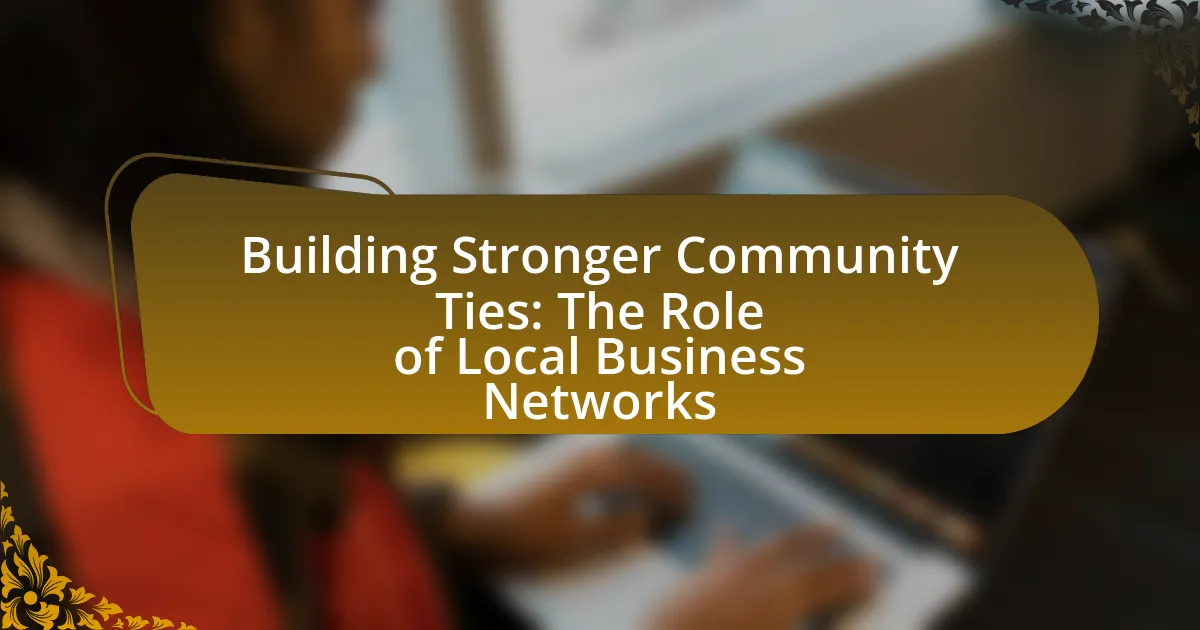Local business networks are collaborative groups of businesses within a specific geographic area that play a crucial role in community building by fostering relationships, enhancing local economies, and promoting social cohesion. These networks facilitate collaboration among entrepreneurs, leading to increased economic resilience and community engagement through initiatives such as events and charitable support. The article explores the functions of local business networks, their impact on economic growth and social ties, strategies for effective community engagement, and the challenges these networks face. Additionally, it highlights best practices for local businesses to strengthen community connections and measure the success of their engagement efforts.

What are Local Business Networks and Their Importance in Community Building?
Local business networks are collaborative groups of businesses within a specific geographic area that work together to support each other and enhance the local economy. These networks are important for community building as they foster relationships among business owners, encourage local spending, and create a sense of belonging among community members. Research indicates that communities with strong local business networks experience increased economic resilience, as local businesses are more likely to reinvest in their communities compared to larger, non-local corporations. Additionally, local business networks often engage in community initiatives, such as sponsoring events or supporting local charities, which further strengthens community ties and enhances social cohesion.
How do Local Business Networks function within a community?
Local Business Networks function within a community by facilitating connections among local entrepreneurs, fostering collaboration, and enhancing economic growth. These networks provide a platform for businesses to share resources, knowledge, and referrals, which strengthens the local economy. For example, a study by the American Independent Business Alliance found that local businesses reinvest approximately 3.5 times more money into the local economy compared to chain stores, demonstrating the economic impact of these networks. Additionally, local business networks often organize events and initiatives that promote community engagement, further solidifying their role in building stronger community ties.
What roles do local businesses play in fostering community ties?
Local businesses play a crucial role in fostering community ties by creating economic opportunities, promoting local culture, and enhancing social interactions. They contribute to the local economy by providing jobs and supporting other local enterprises, which strengthens the financial foundation of the community. Additionally, local businesses often engage in community events and sponsorships, which helps to build relationships among residents and creates a sense of belonging. Research indicates that communities with a higher density of local businesses experience greater social cohesion and trust among residents, as these businesses serve as gathering places and facilitate networking opportunities.
How do local business networks facilitate collaboration among members?
Local business networks facilitate collaboration among members by providing a structured environment for sharing resources, knowledge, and opportunities. These networks often host events, workshops, and meetings that encourage interaction and relationship-building among local entrepreneurs. For instance, a study by the Kauffman Foundation found that businesses involved in local networks reported a 30% increase in collaborative projects and partnerships, demonstrating the effectiveness of these networks in fostering cooperation. Additionally, local business networks often create platforms for members to exchange referrals and support each other’s initiatives, further enhancing collaborative efforts within the community.
Why are Local Business Networks essential for community development?
Local Business Networks are essential for community development because they foster economic growth, enhance social cohesion, and promote local entrepreneurship. These networks create opportunities for collaboration among businesses, which leads to increased job creation and retention within the community. For instance, a study by the American Independent Business Alliance found that local businesses generate 70% more local economic activity per square foot than chain stores, demonstrating their significant impact on community wealth. Additionally, Local Business Networks facilitate knowledge sharing and resource pooling, which can help small businesses thrive and innovate, further contributing to the overall health of the community.
What impact do local business networks have on economic growth?
Local business networks significantly enhance economic growth by fostering collaboration, innovation, and resource sharing among businesses. These networks create an environment where local enterprises can exchange ideas, access new markets, and leverage collective resources, leading to increased productivity and competitiveness. For instance, a study by the Kauffman Foundation found that regions with strong local business networks experience higher rates of entrepreneurship and job creation, as businesses benefit from shared knowledge and support systems. This interconnectedness not only stimulates local economies but also contributes to a more resilient economic landscape.
How do these networks enhance social cohesion within communities?
Local business networks enhance social cohesion within communities by fostering relationships among residents and creating a sense of belonging. These networks facilitate collaboration and communication, allowing local businesses to engage with community members, share resources, and support local initiatives. For instance, studies have shown that communities with active local business networks experience increased trust and cooperation among residents, leading to stronger social ties. Additionally, local businesses often sponsor community events, which further encourages interaction and participation among residents, reinforcing community bonds.

What Strategies Can Local Businesses Use to Strengthen Community Ties?
Local businesses can strengthen community ties by actively engaging in community events and supporting local initiatives. By sponsoring local sports teams, participating in charity events, or hosting community gatherings, businesses create a sense of belonging and foster relationships with residents. Research indicates that businesses involved in community engagement see a 20% increase in customer loyalty, as consumers prefer to support companies that contribute positively to their communities. Additionally, forming partnerships with other local businesses can enhance visibility and create a network of support, further solidifying community connections.
How can local businesses engage with their communities effectively?
Local businesses can engage with their communities effectively by actively participating in community events and supporting local initiatives. This involvement fosters relationships and builds trust, as evidenced by a study from the American Express 2021 Small Business Economic Impact Study, which found that 70% of consumers are more likely to support businesses that contribute to their community. Additionally, local businesses can collaborate with schools, charities, and other organizations to create programs that benefit the community, enhancing their visibility and reputation. By prioritizing local sourcing and hiring, businesses can further strengthen their ties, as this approach not only supports the local economy but also resonates with community values.
What types of community events can local businesses organize?
Local businesses can organize various types of community events, including farmers’ markets, charity fundraisers, workshops, networking events, and holiday celebrations. These events foster community engagement and support local economies. For instance, farmers’ markets provide a platform for local farmers and artisans to sell their products, promoting local agriculture and sustainability. Charity fundraisers can raise money for local causes, enhancing community welfare. Workshops can offer skill-building opportunities, while networking events help local entrepreneurs connect and collaborate. Holiday celebrations, such as parades or festivals, strengthen community bonds and encourage local participation.
How can partnerships with local organizations enhance community ties?
Partnerships with local organizations enhance community ties by fostering collaboration and resource sharing, which strengthens social networks. When local businesses and organizations work together, they create opportunities for community engagement through events, initiatives, and support systems that address local needs. For instance, a study by the National League of Cities found that cities with active local partnerships report higher levels of community satisfaction and cohesion. This collaboration not only builds trust among residents but also encourages a sense of belonging, as individuals feel more connected to their community through shared goals and activities.
What role does communication play in building stronger community ties?
Communication is essential in building stronger community ties as it fosters relationships, enhances trust, and facilitates collaboration among community members. Effective communication allows individuals to share ideas, express needs, and engage in dialogue, which strengthens social bonds. Research indicates that communities with high levels of communication experience increased participation in local events and initiatives, leading to a more cohesive social fabric. For instance, a study by the Pew Research Center found that neighborhoods with active communication networks report higher levels of civic engagement and community satisfaction. This demonstrates that communication not only connects individuals but also empowers them to work together towards common goals, ultimately reinforcing community ties.
How can local businesses utilize social media to connect with the community?
Local businesses can utilize social media to connect with the community by actively engaging with local customers through targeted content, promotions, and community-focused events. By sharing updates, responding to customer inquiries, and highlighting local partnerships, businesses foster a sense of belonging and loyalty. For instance, a study by the Pew Research Center found that 69% of adults in the U.S. use social media, making it an effective platform for local outreach. Additionally, businesses can leverage user-generated content, such as customer testimonials and local events, to enhance community engagement and visibility.
What are effective methods for local businesses to gather community feedback?
Local businesses can effectively gather community feedback through surveys, social media engagement, and community events. Surveys, both online and offline, allow businesses to collect structured feedback from customers about their products and services. For instance, a study by SurveyMonkey found that 70% of consumers prefer to provide feedback through online surveys. Social media platforms enable businesses to interact directly with their community, facilitating real-time feedback and discussions. According to a report by Sprout Social, 64% of consumers want brands to connect with them on social media. Additionally, hosting community events provides a platform for face-to-face interactions, allowing businesses to gather qualitative feedback and strengthen relationships. These methods collectively enhance local businesses’ understanding of community needs and preferences.

What Challenges Do Local Business Networks Face in Community Engagement?
Local business networks face several challenges in community engagement, primarily including limited resources, lack of awareness, and difficulty in measuring impact. Limited resources, such as funding and manpower, hinder their ability to organize events and initiatives that foster community ties. Additionally, many local businesses struggle with a lack of awareness about the benefits of community engagement, which can lead to insufficient participation in network activities. Furthermore, measuring the impact of community engagement efforts poses a challenge, as businesses often lack the tools or metrics to assess their effectiveness, making it difficult to justify investments in such initiatives. These factors collectively impede the ability of local business networks to effectively engage with their communities.
What barriers exist for local businesses in forming networks?
Local businesses face several barriers in forming networks, including lack of resources, limited access to information, and geographical isolation. These barriers hinder collaboration and communication among businesses, making it difficult to establish effective networks. For instance, many small businesses may lack the financial means to participate in networking events or invest in technology that facilitates connections. Additionally, local businesses often struggle to access relevant information about potential partners or networking opportunities, which can limit their ability to engage with others in their community. Geographical isolation can further exacerbate these challenges, as businesses in rural areas may find it harder to connect with others compared to those in urban settings.
How can competition among local businesses hinder collaboration?
Competition among local businesses can hinder collaboration by fostering an environment of distrust and self-interest. When businesses prioritize competing for customers and market share, they may be less willing to share resources, information, or engage in joint initiatives that could benefit the community. This competitive mindset can lead to a reluctance to form partnerships or networks that are essential for collective growth and community development. Research indicates that high levels of competition can create barriers to collaboration, as businesses fear that sharing insights or working together may undermine their competitive advantage.
What are the common misconceptions about local business networks?
Common misconceptions about local business networks include the belief that they are only beneficial for large businesses, that participation requires a significant time commitment, and that they primarily focus on direct sales rather than relationship building. Many small business owners assume that local networks cater exclusively to larger enterprises, but studies show that small businesses often gain the most from these connections, as they provide essential support and resources. Additionally, while some may think that engaging in local networks demands extensive time investment, many groups offer flexible participation options that accommodate varying schedules. Lastly, the notion that local business networks are solely about immediate sales overlooks their true value in fostering long-term relationships, which can lead to referrals and collaborative opportunities, as evidenced by research from the Kauffman Foundation highlighting the importance of networking in business growth.
How can local businesses overcome these challenges?
Local businesses can overcome challenges by actively engaging in community networks and collaborations. By forming partnerships with other local businesses, they can share resources, knowledge, and customer bases, which enhances their visibility and competitiveness. For instance, a study by the American Independent Business Alliance found that local businesses that collaborate with one another can increase their sales by up to 20%. Additionally, participating in community events and supporting local causes fosters goodwill and strengthens customer loyalty, which is crucial for sustaining business in competitive markets.
What best practices can local businesses adopt to foster collaboration?
Local businesses can foster collaboration by actively participating in community events and forming partnerships with other local entities. Engaging in joint marketing initiatives, such as co-hosting events or cross-promotions, allows businesses to leverage each other’s customer bases, enhancing visibility and reach. Additionally, establishing regular networking meetings or forums encourages knowledge sharing and resource pooling among local businesses, which can lead to innovative solutions and mutual support. Research indicates that businesses involved in local networks experience a 20% increase in sales due to collaborative efforts, demonstrating the effectiveness of these practices in strengthening community ties.
How can local businesses leverage technology to enhance networking?
Local businesses can leverage technology to enhance networking by utilizing social media platforms, online networking tools, and customer relationship management (CRM) systems. Social media platforms like Facebook and LinkedIn allow businesses to connect with other local enterprises and engage with their community, fostering relationships and collaborations. Online networking tools, such as Meetup and Eventbrite, enable businesses to organize and participate in local events, further expanding their network. Additionally, CRM systems help businesses manage contacts and interactions, streamlining communication and relationship-building efforts. According to a 2021 survey by the Small Business Administration, 70% of small businesses reported that social media significantly improved their networking capabilities, demonstrating the effectiveness of technology in enhancing local business connections.
What are the best practices for building stronger community ties through local business networks?
The best practices for building stronger community ties through local business networks include fostering collaboration, engaging in community events, and supporting local initiatives. Collaboration among local businesses enhances resource sharing and creates a unified front that benefits the community. Engaging in community events, such as fairs or markets, allows businesses to connect with residents, fostering relationships and trust. Supporting local initiatives, like charity drives or educational programs, demonstrates a commitment to the community’s well-being, which can strengthen ties and encourage local patronage. These practices are validated by studies showing that businesses involved in community engagement experience increased customer loyalty and improved public perception.
How can local businesses measure the success of their community engagement efforts?
Local businesses can measure the success of their community engagement efforts through metrics such as increased foot traffic, customer feedback, and social media engagement. By tracking foot traffic before and after community events, businesses can quantify the impact of their engagement. Customer feedback, collected through surveys or direct interactions, provides qualitative insights into community perceptions and satisfaction. Additionally, monitoring social media metrics, such as likes, shares, and comments related to community initiatives, offers a clear indication of public interest and engagement levels. These methods collectively provide a comprehensive view of the effectiveness of community engagement strategies.
What resources are available for local businesses to improve their networking strategies?
Local businesses can improve their networking strategies through resources such as local chambers of commerce, business associations, and networking events. Chambers of commerce provide platforms for businesses to connect, share resources, and collaborate on community initiatives, which fosters stronger relationships. Business associations often host workshops and seminars focused on networking skills and strategies, enhancing members’ ability to build connections. Additionally, networking events, such as meetups and trade shows, offer opportunities for local businesses to engage directly with potential partners and customers, facilitating relationship-building. These resources are essential for creating a robust local business network that can lead to increased collaboration and community support.
